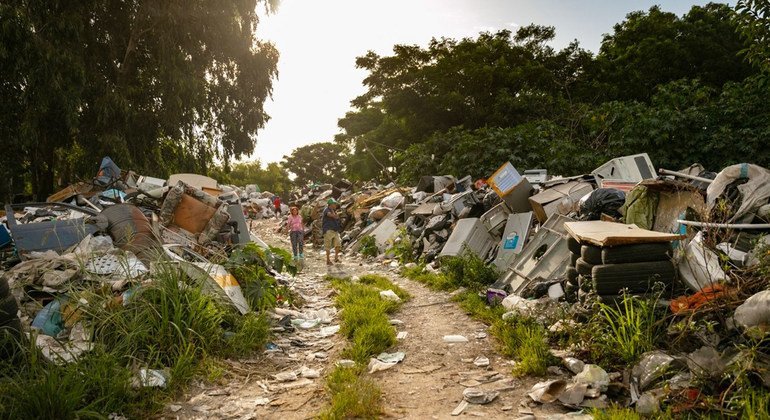UN trade agency warns digital boom could be environmental bust

These are just some of the worrying findings in a new report on the digital economy from the UN trade agency. United Nations Conference on Trade and Development (UNCTAD)which emphasizes that The negative impact of the booming industry on the environment must be taken more seriously – and slowed down by investing in renewable energy.
“The development of technologies such as artificial intelligence and cryptocurrencies, cryptocurrency mining has significantly increased energy consumption“Ms. Rebeca Grynspan, Director of UNCTAD said.
Lust for Power
“For example, the energy consumption of Bitcoin mining increased 34-fold from 2015 to 2020, reaching around 121 terawatt hours… Bitcoin mining consumes more energy than Belgium or Finland each year,” the UNCTAD Secretary-General told journalists in Geneva.
Today, some 5.4 billion people use the internet, and the global digital economy is booming, with many positives that are clear to many. In value terms alone, business e-commerce sales are set to soar from $17 trillion in 2016 to $27 trillion in 2022 across 43 countries, Grynspan noted.
“We talk a lot about how digital technology can reduce paper use and improve energy efficiency, and can help cut greenhouse gas emissions across the transport, building, agriculture and energy sectors.
“But the downsides are not talked about much,” she said, noting that digitization is “highly material” in addition to requiring large amounts of carbon-intensive electricity.
To combat this threat to the environment and support a fair and environmentally responsible digital economy, UNCTAD Economic Report 2024 makes policy recommendations regarding precious minerals used to manufacture electronic devices like mobile phones and other important natural resources like water.
Energy needs of data centers
According to UNCTAD, in 2022, global data centers consumed 460 terawatt hours, equivalent to the amount of electricity used by 42 million households in the United States in a year. This figure is expected to double by 2026.
The UN agency also cited estimates that The digital industry is responsible for 1.5 to 3.2 percent of global greenhouse gas emissions.similar to air freight and sea freight.
Between 2018 and 2022, the electricity consumption of 13 major data center operators doubled, highlighting the urgent need to address the energy and water consumption of these technologies.
“Google disclosed that in 2022, its total water consumption in its data centers and offices was 5.6 billion gallons. In the same year, Microsoft reported that its water consumption was 6.4 million cubic meters,” Grynspan said, adding that Water consumption by such facilities has recently caused tensions in local communities in several countries..
The UNCTAD chief also noted that according to Microsoft, training ChatGPT-3 alone requires an estimated 700,000 liters of clean water.
The Rise of E-Commerce and E-Waste
The report said e-commerce has skyrocketed, with online shoppers rising from less than 100 million in 2000 to 2.3 billion in 2021. This increase has led to a 30 percent increase in digital-related waste from 2010 to 2022, reaching 10.5 million tonnes globally.
“Digital waste management remains inadequate. This is a major concern due to the pollution it creates and its impact on the environment,” said the UNCTAD Secretary-General.
The report notes that developed countries generate 3.25 kg of digital waste per capita, compared to less than 1 kg in developing countries and just 0.21 kg in least developed countries, another indicator of the uneven distribution of the benefits of digitalization.
Important Minerals
The World Bank estimates that demand for minerals needed for digitalization such as graphite, lithium and cobalt could skyrocket by 500% by 2050, the report’s authors said.
Developing countries play an important role in the global supply chains of minerals and transition metals, which are highly concentrated in a few regions.
For example, Africa’s vast mineral deposits, which are essential to the global transition to digital and low-carbon technologies, including cobalt, copper and lithium, are vital to a sustainable energy future.
The continent holds significant reserves, accounting for 55% of the world’s cobalt, 47.65% of its manganese, 21.6% of its natural graphite, 5.9% of its copper, 5.6% of its nickel, and 1% of its lithium.

An e-waste worker disassembles items at a recycling shop in Ghana.
Development opportunities
“The rising demand for critical minerals creates opportunities for resource-rich developing countries to add value to their mined minerals, diversify their economies and boost development. But technology must be transferred and made more efficient to be compatible with environmental and climate change goals,” said Secretary-General Grynspan.
In the current global crisis, with limited fiscal space, slow growth and high debt, developing countries should maximise this opportunity by processing and producing domestically, the report authors suggest. This will help them secure a larger share of the global digital economy, generate government revenue, finance development, overcome commodity dependence, create jobs and raise living standards.
Global demand for clean energy is rising goods Foreign direct investment in Latin America is growing strongly, accounting for 23 percent of the region’s new investment project value over the past two years, the report shows.
Success Factors
UNCTAD proposes new business models and strong policies for more sustainable digital growth. The UN trade and development experts’ straightforward recommendations to the world are:
– use circular economy modelfocus on recycling, reusing and recovering digital documents to reduce waste and environmental damage;
– resource optimization by planning more efficient use of raw materials and reducing total usage;
– strengthen regulationsenforce stricter environmental standards and regulations to minimize the ecological impact of digital technology;
– invest in renewable energysupport research and development of energy-saving technologies and sustainable digital operations;
– promote international cooperationencourage countries to work together to ensure equitable access to digital technologies and resources, and to address global digital waste and resource exploitation issues.
“The digital economy is central to global growth and development opportunities, so we need to implement activities that move us towards a win-win space, not against our important goals of environmental sustainability and our commitments to climate change,” concludes Rebeca Grynspan.


